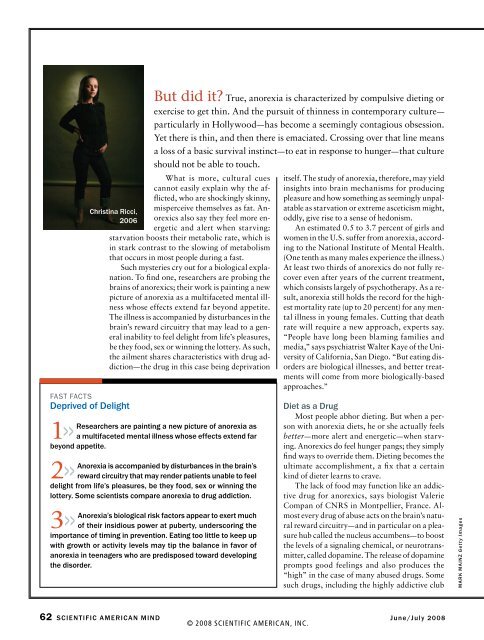Addicted to Starvation - Trisha Gura
Addicted to Starvation - Trisha Gura
Addicted to Starvation - Trisha Gura
You also want an ePaper? Increase the reach of your titles
YUMPU automatically turns print PDFs into web optimized ePapers that Google loves.
But did it? True, anorexia is characterized by compulsive dieting or<br />
exercise <strong>to</strong> get thin. And the pursuit of thinness in contemporary culture—<br />
particularly in Hollywood—has become a seemingly contagious obsession.<br />
Yet there is thin, and then there is emaciated. Crossing over that line means<br />
a loss of a basic survival instinct—<strong>to</strong> eat in response <strong>to</strong> hunger—that culture<br />
should not be able <strong>to</strong> <strong>to</strong>uch.<br />
What is more, cultural cues itself. The study of anorexia, therefore, may yield<br />
cannot easily explain why the af- insights in<strong>to</strong> brain mechanisms for producing<br />
flicted, who are shockingly skinny, pleasure and how something as seemingly unpal-<br />
christina ricci,<br />
2006<br />
misperceive themselves as fat. Anorexics<br />
also say they feel more energetic<br />
and alert when starving:<br />
atable as starvation or extreme asceticism might,<br />
oddly, give rise <strong>to</strong> a sense of hedonism.<br />
An estimated 0.5 <strong>to</strong> 3.7 percent of girls and<br />
starvation boosts their metabolic rate, which is women in the U.S. suffer from anorexia, accord-<br />
in stark contrast <strong>to</strong> the slowing of metabolism ing <strong>to</strong> the National Institute of Mental Health.<br />
that occurs in most people during a fast.<br />
(One tenth as many males experience the illness.)<br />
Such mysteries cry out for a biological expla- At least two thirds of anorexics do not fully renation.<br />
To find one, researchers are probing the cover even after years of the current treatment,<br />
brains of anorexics; their work is painting a new which consists largely of psychotherapy. As a re-<br />
picture of anorexia as a multifaceted mental illsult, anorexia still holds the record for the highness<br />
whose effects extend far beyond appetite. est mortality rate (up <strong>to</strong> 20 percent) for any men-<br />
The illness is accompanied by disturbances in the tal illness in young females. Cutting that death<br />
brain’s reward circuitry that may lead <strong>to</strong> a gen- rate will require a new approach, experts say.<br />
eral inability <strong>to</strong> feel delight from life’s pleasures, “People have long been blaming families and<br />
be they food, sex or winning the lottery. As such, media,” says psychiatrist Walter Kaye of the Uni-<br />
the ailment shares characteristics with drug adversity of California, San Diego. “But eating disdiction—the<br />
drug in this case being deprivation orders are biological illnesses, and better treatments<br />
will come from more biologically-based<br />
approaches.”<br />
fAst fActs<br />
deprived of delight<br />
1>><br />
researchers are painting a new picture of anorexia as<br />
a multifaceted mental illness whose effects extend far<br />
beyond appetite.<br />
2>><br />
anorexia is accompanied by disturbances in the brain’s<br />
reward circuitry that may render patients unable <strong>to</strong> feel<br />
delight from life’s pleasures, be they food, sex or winning the<br />
lottery. some scientists compare anorexia <strong>to</strong> drug addiction.<br />
3>><br />
anorexia’s biological risk fac<strong>to</strong>rs appear <strong>to</strong> exert much<br />
of their insidious power at puberty, underscoring the<br />
importance of timing in prevention. eating <strong>to</strong>o little <strong>to</strong> keep up<br />
with growth or activity levels may tip the balance in favor of<br />
anorexia in teenagers who are predisposed <strong>to</strong>ward developing<br />
the disorder.<br />
diet as a drug<br />
Most people abhor dieting. But when a person<br />
with anorexia diets, he or she actually feels<br />
better—more alert and energetic—when starving.<br />
Anorexics do feel hunger pangs; they simply<br />
find ways <strong>to</strong> override them. Dieting becomes the<br />
ultimate accomplishment, a fix that a certain<br />
kind of dieter learns <strong>to</strong> crave.<br />
The lack of food may function like an addictive<br />
drug for anorexics, says biologist Valerie<br />
Compan of CNRS in Montpellier, France. Almost<br />
every drug of abuse acts on the brain’s natural<br />
reward circuitry—and in particular on a pleasure<br />
hub called the nucleus accumbens—<strong>to</strong> boost Images<br />
the levels of a signaling chemical, or neurotrans-<br />
Getty<br />
mitter, called dopamine. The release of dopamine<br />
prompts good feelings and also produces the<br />
mainz<br />
“high” in the case of many abused drugs. Some<br />
such drugs, including the highly addictive club mark<br />
62 scientific american mind June/July 2008<br />
© 2008 SCIENTIFIC AMERICAN, INC.



